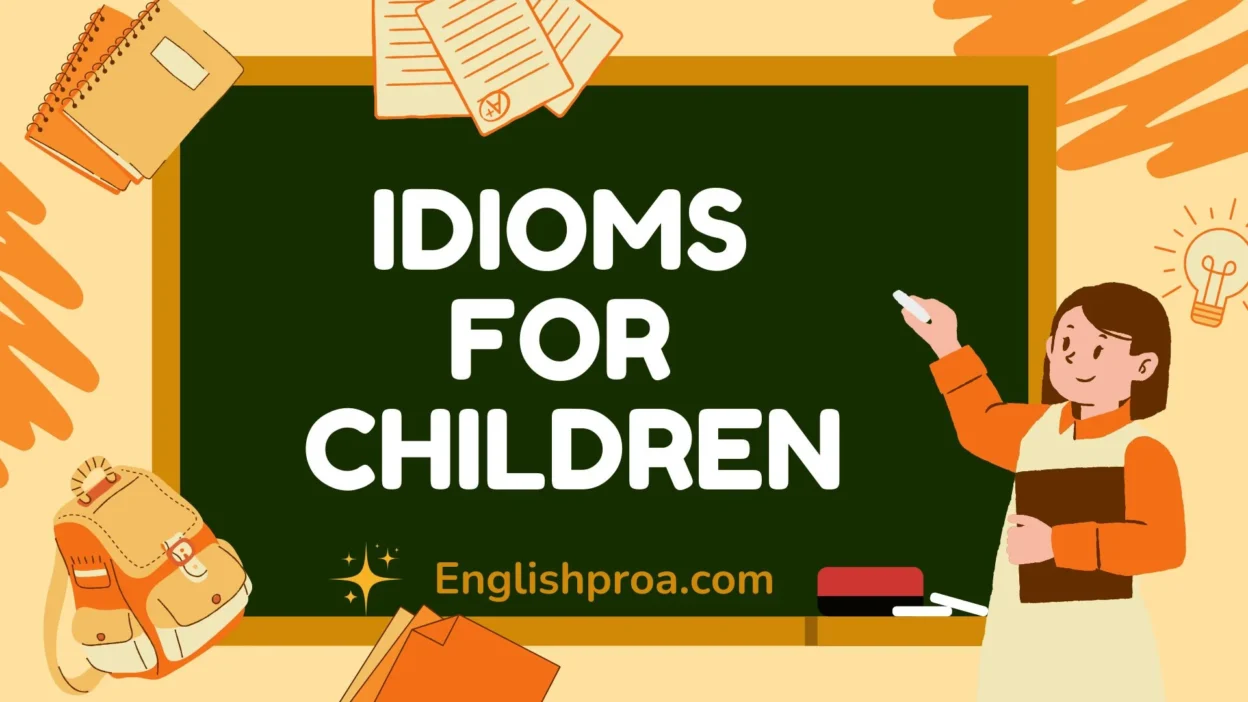As a parent, teacher, or caregiver, you know how powerful words can be—especially for children. The right phrase can spark laughter, ease confusion, or build a child’s confidence. That’s why idioms—those playful and expressive sayings—are such a joy to teach. In this article, we’ll explore 30 child-friendly idioms that are not only fun but also rich in meaning. These phrases help children express themselves with warmth, care, and creativity, and are a wonderful tool for language learning, emotional intelligence, and social connection.
As someone who’s worked with children both as an educator and a parent, I’ve seen firsthand how using thoughtful, age-appropriate idioms helps kids feel understood and empowered. Let’s dive in and explore these delightful expressions together!
1. A piece of cake
Meaning: Something very easy to do.
In a sentence: “Don’t worry about the spelling test—it’ll be a piece of cake!”
Best Use: When encouraging a child before a simple task.
Not Use: In serious or formal contexts.
Other ways to say: Super easy, no big deal, simple as ABC.
2. Hold your horses
Meaning: Be patient or wait a moment.
In a sentence: “Hold your horses! We’ll leave for the park after lunch.”
Best Use: Teaching patience in a playful way.
Not Use: When a child is already upset or anxious.
Other ways to say: Hang on, wait a sec, just a moment.
3. Break the ice
Meaning: Start a conversation in a friendly way.
In a sentence: “Telling a joke can help break the ice when you meet new friends.”
Best Use: Helping children with social skills.
Not Use: When discussing actual cold or dangerous situations.
Other ways to say: Start things off, get things going.
4. Hit the hay
Meaning: Go to bed or go to sleep.
In a sentence: “Time to hit the hay, sweetie—you’ve got school tomorrow!”
Best Use: At bedtime with a gentle, caring tone.
Not Use: In situations requiring literal action.
Other ways to say: Go to sleep, tuck in, lights out.
5. Let the cat out of the bag
Meaning: Reveal a secret.
In a sentence: “Oops! I let the cat out of the bag about your surprise party!”
Best Use: When talking about surprises or secrets.
Not Use: When discussing real animals or literal bags.
Other ways to say: Spill the beans, reveal the secret.
6. Cold feet
Meaning: To be nervous or scared at the last minute.
In a sentence: “She got cold feet before the school play.”
Best Use: To normalize fear and build empathy.
Not Use: In literal cold situations.
Other ways to say: Got nervous, had second thoughts.
7. Under the weather
Meaning: Feeling sick or unwell.
In a sentence: “I’m a little under the weather, so I’ll stay home today.”
Best Use: To help children understand and express illness gently.
Not Use: In medical emergencies.
Other ways to say: Not feeling well, a little sick.
8. On cloud nine
Meaning: Very happy or excited.
In a sentence: “He was on cloud nine after getting a gold star!”
Best Use: Celebrating positive emotions.
Not Use: In somber or serious conversations.
Other ways to say: Super happy, thrilled, over the moon.
9. Cry over spilled milk
Meaning: Don’t be upset about things that can’t be changed.
In a sentence: “It’s okay if the paint spilled—no use crying over spilled milk.”
Best Use: Teaching resilience.
Not Use: When a child is truly grieving or in distress.
Other ways to say: Let it go, don’t worry about it.
10. The early bird gets the worm
Meaning: People who act early succeed.
In a sentence: “The early bird gets the worm, so let’s pack your bag tonight!”
Best Use: Encouraging preparation.
Not Use: When a child needs rest or flexibility.
Other ways to say: Be prepared, act early.
11. Once in a blue moon
Meaning: Something that happens rarely.
In a sentence: “We go out for pancakes once in a blue moon.”
Best Use: Describing rare treats or events.
Not Use: To dismiss a child’s wants or ideas.
Other ways to say: Every now and then, hardly ever.
12. Cat got your tongue?
Meaning: Asking someone why they’re silent.
In a sentence: “Cat got your tongue? You’ve been so quiet!”
Best Use: Playfully inviting a child to talk.
Not Use: If a child is shy or upset.
Other ways to say: What’s on your mind? Are you okay?
13. Like two peas in a pod
Meaning: Very close or alike.
In a sentence: “You and your best friend are like two peas in a pod.”
Best Use: Highlighting friendships.
Not Use: When comparing people negatively.
Other ways to say: Inseparable, best buddies.
14. Full of beans
Meaning: Very energetic.
In a sentence: “You’re full of beans this morning!”
Best Use: Playful encouragement of energy.
Not Use: When trying to calm a child down.
Other ways to say: Energetic, bursting with energy.
15. Raining cats and dogs
Meaning: Raining very heavily.
In a sentence: “Let’s stay in—it’s raining cats and dogs out there!”
Best Use: Describing wild weather in a fun way.
Not Use: During serious weather warnings.
Other ways to say: Pouring, coming down hard.
16. As cool as a cucumber
Meaning: Very calm and relaxed.
In a sentence: “She stayed as cool as a cucumber during her recital.”
Best Use: Encouraging confidence.
Not Use: In high-stress situations needing urgency.
Other ways to say: Calm, collected, chill.
17. Spill the beans
Meaning: Tell a secret.
In a sentence: “Come on, spill the beans—what’s the surprise?”
Best Use: During lighthearted sharing.
Not Use: If trust or privacy is involved.
Other ways to say: Share the news, let it out.
18. Monkey see, monkey do
Meaning: Copying someone else’s actions.
In a sentence: “Be careful what you say—monkey see, monkey do!”
Best Use: Teaching self-awareness.
Not Use: To scold or mock a child.
Other ways to say: Imitate, follow the leader.
19. Hit the nail on the head
Meaning: To be exactly right.
In a sentence: “You hit the nail on the head with that answer!”
Best Use: Giving praise.
Not Use: In unrelated literal situations.
Other ways to say: Got it right, nailed it.
20. Put your thinking cap on
Meaning: Time to think carefully.
In a sentence: “Let’s put our thinking caps on and solve this puzzle.”
Best Use: Encouraging problem-solving.
Not Use: During overwhelming situations.
Other ways to say: Think hard, brainstorm.
21. Back to the drawing board
Meaning: Try again after failing.
In a sentence: “Our model collapsed—back to the drawing board!”
Best Use: Teaching perseverance.
Not Use: If a child is discouraged.
Other ways to say: Try again, start over.
22. In hot water
Meaning: In trouble.
In a sentence: “He was in hot water for staying up too late.”
Best Use: Light warnings.
Not Use: When a child is truly in distress.
Other ways to say: In trouble, caught red-handed.
23. Bite your tongue
Meaning: Stop yourself from saying something.
In a sentence: “I had to bite my tongue when I heard that!”
Best Use: Teaching self-control.
Not Use: In literal or painful contexts.
Other ways to say: Hold back, keep quiet.
24. Jump the gun
Meaning: Do something too soon.
In a sentence: “Oops, we jumped the gun and opened the gift early!”
Best Use: Teaching timing.
Not Use: When discussing actual safety.
Other ways to say: Act too early, get ahead of yourself.
25. Keep an eye out
Meaning: Watch carefully.
In a sentence: “Keep an eye out for your sister while we shop.”
Best Use: Encouraging responsibility.
Not Use: If child may misinterpret it literally.
Other ways to say: Watch for, stay alert.
26. Blow off steam
Meaning: Release energy or anger.
In a sentence: “Go play outside to blow off some steam.”
Best Use: Helping kids manage emotions.
Not Use: In serious emotional discussions.
Other ways to say: Let it out, cool down.
27. Out of the blue
Meaning: Unexpectedly.
In a sentence: “She called me out of the blue—what a surprise!”
Best Use: Describing fun surprises.
Not Use: When the event is upsetting.
Other ways to say: Suddenly, unexpectedly.
28. Don’t judge a book by its cover
Meaning: Don’t judge by appearance.
In a sentence: “He may look shy, but don’t judge a book by its cover!”
Best Use: Teaching kindness and open-mindedness.
Not Use: When looks are essential (e.g., safety gear).
Other ways to say: Look deeper, appearances can be deceiving.
29. The ball is in your court
Meaning: It’s your turn to decide.
In a sentence: “You can pick the game—the ball is in your court.”
Best Use: Teaching responsibility.
Not Use: When a child feels overwhelmed.
Other ways to say: It’s your choice, up to you.
30. You can’t have your cake and eat it too
Meaning: You can’t do two conflicting things at once.
In a sentence: “You want to stay up late and feel great tomorrow? You can’t have your cake and eat it too!”
Best Use: Teaching realistic expectations.
Not Use: When comforting a child.
Other ways to say: Make a choice, can’t do both.
FAQs: 30 Idioms for Children
1. Why are idioms important for children?
Idioms help children understand figurative language, express emotions, and connect with others more meaningfully.
2. How can I teach idioms in a fun way?
Use stories, cartoons, or role-playing games to bring idioms to life in everyday scenarios.
3. Are idioms confusing for young children?
Sometimes, yes. That’s why it’s best to introduce them with clear examples and in relatable contexts.
4. Can idioms help with emotional learning?
Absolutely! Idioms often reflect feelings and situations, helping children name and navigate their emotions.
5. Should I use idioms even with ESL learners?
Yes—but go slow. Use visuals and repetition to help non-native speakers understand and enjoy them.
Conclusion: Helping Kids Speak with Heart and Imagination
Teaching children idioms is more than just adding fun phrases to their vocabulary—it’s about giving them tools to connect, understand, and express themselves thoughtfully. When you invite a child to “put on their thinking cap” or reassure them that something is “a piece of cake,” you’re doing more than speaking; you’re nurturing confidence, connection, and care.
I’ve seen the magic that idioms bring into a child’s world—whether it’s turning frustration into laughter or sparking meaningful conversation. Let these 30 idioms become part of your shared language, building a stronger bond one warm, expressive phrase at a time.





